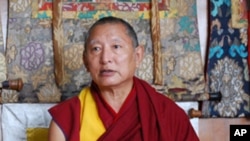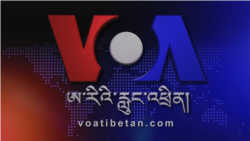The head of the Tibetan monastery that saw one its monks sentenced to death Thursday for inciting self-immolation has condemned the Chinese justice system. The head of the monastery implored Beijing to be more liberal in its treatment of Tibetan dissidents.
Lorang Konchok, a monk at the Kirti Monastery in Aba county, Sichuan province, was one of eight activists to be prosecuted in a Chinese court. He was condemned to death with a two-year suspension - a sentence that usually is commuted to life imprisonment.
The Kirti Monastery has emerged as a hub for protests against Chinese rule of Tibet. Since 2009, almost 100 Tibetans have self-immolated.
Focus on Kirti Monastery
Between 15 and 30 are believed to be members of the monastery, which remains under tight control by Chinese security forces.
The 11th Kirti Rinpoche, the head of the monastery, has been living in exile in India for over 50 years. He told VOA the situation is increasingly serious.
“We are facing the virtual extermination of the Tibetan people and nation. It is the opposite of what China claims Tibet to be; namely a socialist paradise.
“These immolations… are the result of individual and voluntary action. I would appeal to the Chinese government to be liberal to the Tibetan people,” he said.
The elderly lama is participating in a four-day peace camp in the Indian capital, New Delhi, where more than 6,000 Tibetans from the Diaspora have gathered.
Human rights issues
Asked whether he would condone self-immolation or reject it outright, Kirti Rinpoche responded with the following:
“I am in no position to communicate or advise Tibetans inside Tibet. But to Tibetans living in the Free World, I would advise that there are other ways to vent your feelings and express protest.”
As the New Delhi peace camp entered day three Friday, men and women in the large crowd wept as Tibetan children performed a play depicting Chinese human rights abuses.
Lobsang Dawa, a 17-year-old performer, described the impetus for the play, including arbitrary arrest, torture and mass Han immigration.
Ten years ago, Dawa’s mother had carried her son across the Himalaya on her back to escape Chinese oppression in Tibet. The young man discussed his hopes for the future.
“As Martin Luther King said, ‘I have a dream.’ We Tibetans also have a dream: that one day we return to Lhasa with the Dalai Lama,” said Dawa.
Protests amid deep concerns
Also at the interfaith protest was Lobsang Sangay, the Sikyong or prime minister of the Tibetan government-in-exile. Sangay was critical of the trial of Lorang Konchok and the seven other activists. He called the verdicts “unhelpful and unjust.”
He rejected comments by Chinese Foreign Ministry spokesman Hong Lei, that the Dalai Lama was behind the growing wave of self-immolations, before calling on China to allow the United Nations and international media to observe future trials of Tibetan dissidents.
“To review their policies and introduce reform is the solution, not introduce more hardline policies. Otherwise you enter a vicious cycle of repression, imprisonment and resentment. The cycle needs to end and the best way is to find a solution through peaceful means,” said Sangay.
Next month marks the 54th anniversary of the Dalai Lama’s escape from Lhasa, and the annual commemoration of anti-China protests across the Tibetan plateau in March 2008.
Consensus in the Diaspora is that the death sentence faced by Konchok marks the beginning of a renewed Chinese crackdown on Tibetan dissent.






